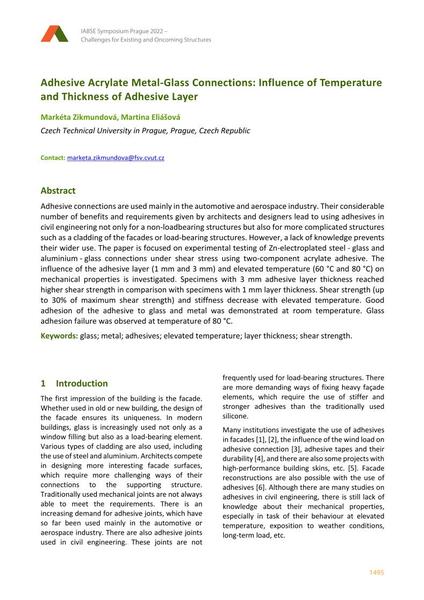Adhesive Acrylate Metal-Glass Connections: Influence of Temperature and Thickness of Adhesive Layer

|
|
|||||||||||
Détails bibliographiques
| Auteur(s): |
Dimitra V. Achillopoulou
(Czech Technical University in Prague, Prague, Czech Republic)
Nikoleta K. Stamataki (Czech Technical University in Prague, Prague, Czech Republic) |
||||
|---|---|---|---|---|---|
| Médium: | papier de conférence | ||||
| Langue(s): | anglais | ||||
| Conférence: | IABSE Symposium: Challenges for Existing and Oncoming Structures, Prague, Czech Republic, 25-27 May 2022 | ||||
| Publié dans: | IABSE Symposium Prague 2022 | ||||
|
|||||
| Page(s): | 1495-1502 | ||||
| Nombre total de pages (du PDF): | 8 | ||||
| DOI: | 10.2749/prague.2022.1495 | ||||
| Abstrait: |
Adhesive connections are used mainly in the automotive and aerospace industry. Their considerable number of benefits and requirements given by architects and designers lead to using adhesives in civil engineering not only for a non-loadbearing structures but also for more complicated structures such as a cladding of the facades or load-bearing structures. However, a lack of knowledge prevents their wider use. The paper is focused on experimental testing of Zn-electroplated steel - glass and aluminium - glass connections under shear stress using two-component acrylate adhesive. The influence of the adhesive layer (1 mm and 3 mm) and elevated temperature (60 °C and 80 °C) on mechanical properties is investigated. Specimens with 3 mm adhesive layer thickness reached higher shear strength in comparison with specimens with 1 mm layer thickness. Shear strength (up to 30% of maximum shear strength) and stiffness decrease with elevated temperature. Good adhesion of the adhesive to glass and metal was demonstrated at room temperature. Glass adhesion failure was observed at temperature of 80 °C. |
||||
| Copyright: | © 2022 International Association for Bridge and Structural Engineering (IABSE) | ||||
| License: | Cette oeuvre ne peut être utilisée sans la permission de l'auteur ou détenteur des droits. |
||||
